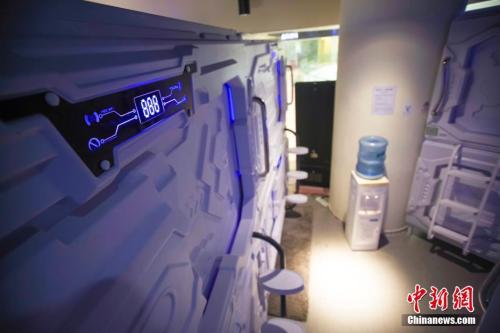Why did online celebrity products encounter operational embarrassment when the "shared sleeping cabin" was suspended in many places?
BEIJING, Beijing, July 19 (Reporter Zhang Ni) The mobile phone can enjoy private sleeping space at a low price by scanning the QR code gently without identity registration. Recently, the "shared sleeping cabin" that appeared in Beijing, Shanghai and other places has attracted people’s attention. However, shortly after its launch, this novelty was urgently suspended.
Why does "shared sleep" encounter such an embarrassing situation? What are the hidden dangers behind the operation? Is there room for development in the future? In response to the above-mentioned series of questions, the reporter of Zhongxin. com conducted an interview survey a few days ago.

On the afternoon of July 18th, the door of the "Sleeping Space" experience store on the second floor of Zhonggang Plaza Venture Corporation in Zhongguancun Street was closed. Zhongxin.com reporter Zhang Nishe
Evacuate many places before it is hot. "Shared sleeping cabin"suspend use.
Recently, something called "shared sleeping cabin" appeared in Beijing, Shanghai and Sichuan. No deposit, no extra charge, no need to register your ID card, you can sleep by turning on your mobile phone to scan the code, and the minimum 6 yuan is half an hour … … The simple operation mode and low price attracted people to watch.
However, this concept of "shared sleep" has not had time for most people to "try it early", and it has ushered in the fate of suspension.
According to media reports, recently, a "shared sleeping cabin" in Zhongguancun, Beijing was closed, and the "shared sleeping cabin" in Yinhe SOHO also temporarily stopped operating.
On the afternoon of the 18th, the reporter from Zhongxin. com came to the "Enjoy Sleeping Space" experience store on the second floor of Zhonggang Plaza Venture Corporation in Zhongguancun Street and found that the door was indeed closed, and the words "System upgrade, suspended use" were posted outside the door.
Subsequently, the reporter scanned the QR code, and the mobile phone popped up a "system update and maintenance" prompt, which could not be used normally.
At the same time, according to media reports, similar situations have occurred in the experience points in Shanghai and Chengdu. Contrary to the fate of bike-sharing, which was quickly spread across the country before, "shared sleep" was embarrassed to leave before it was hot.

On July 17th, a shop named "Enjoy Sleeping Space" in Beijing was closed. China News Service reporter Jia Tianyong photo
Person in charge: it is expected to be officially launched after the initiative to shut down.
Why did the "shared sleeping cabin" stop using? Is this behavior done by the police?
Dai Jiangong, co-founder and CEO of Xiangshui Technology, denied the statement that it was "seized by the police" on the Internet.
Dai Jiangong told the media that the company has not received any rectification opinions or seizure notices from the relevant departments since the pilot at the end of May, but for the sake of long-term development, it is necessary to communicate with relevant departments, so it took the initiative to suspend all "shared sleeping cabins" in Beijing.
He emphasized that the company has put more than a dozen "shared sleeping cabins" in Beijing to test and collect user feedback, but it has not been officially launched. The positioning of this project is not hotels or renting beds, but to provide a comfortable space for office white-collar workers in a relatively closed office building, which is not open to the public at night.
In addition, the person in charge also told the media that there is no approval and license from relevant departments for the "shared sleeping cabin" at present, but the local industrial and commercial administration departments have been invited to check it out and explain the situation to them. The company will be officially launched after obtaining permission from relevant departments such as health and fire protection.

On July 17th, a shop named "Enjoy Sleeping Space" in Beijing was closed. China News Service reporter Jia Tianyong photo
Lack of supervision "shared sleep" has many hidden dangers.
In view of the emergence of the new concept of "shared sleep", there are both support and opposition.
Supporters generally believe that this kind of sleeping cabin is simple to use and low in price, which meets the needs of many office workers for a nap. At the same time, some opponents believe that the health and safety hazards of sleeping cabin are huge.
In this regard, Su Haopeng, a professor at the Law School of the University of International Business and Economics and director of the Consumer Protection Law Research Center, said in an interview with Zhongxin.com that unlike bike-sharing, the "shared sleeping cabin" caused great controversy as soon as it appeared, mainly because its industry was different from that of bike-sharing.
"Although the operator emphasizes that the sleeping cabin is only used by the internal staff of some office buildings, and it is not a 24-hour service, it is provided for others to rest, and it is a market-oriented and profitable behavior. It should be included in the scope of the hotel industry from the perspective of economic format." Su Haopeng emphasized that it is necessary to manage the "shared sleeping cabin" according to the hotel industry from the service content.
He emphasized that the operation of the "shared sleeping cabin" involves a series of management issues such as fire protection, sanitation and public security. If you conduct business activities without the supervision of any relevant departments, it is a violation of the relevant laws and regulations on industrial and commercial management.
Zhu Wei, a professor at China University of Political Science and Law and an expert member of the internet society of china Sharing Economy Working Committee, also believes that in China, the operation of hotels and guesthouses needs the approval of many departments, such as industry and commerce, health and fire protection, but today’s "shared sleeping cabins" do not have these qualifications, which hides many hidden dangers. These "shared sleeping cabins" must obtain the relevant qualifications of offline hotels to ensure the health and safety of users before they can go online.

Under the upsurge of "sharing economy", what can be done with people "share”?
The embarrassing experience of "shared sleeping cabin" has also made people start to think about whether the products that have sprung up under the upsurge of "sharing economy" really belong to the sharing economy, or are they just in the name of "sharing"?
In Su Haopeng’s view, "sharing economy" is not an accurate legal or policy concept. "In a broad sense, as long as a commodity or service is used by an unspecified majority, it can be called ‘ Sharing economy ’ 。”
He believes that the current "shared sleeping cabin" is basically the same model as bike-sharing, and it can be included in the broad sense of "shared economy", which is a new economic form.
On the other hand, not everything is suitable for "sharing". This kind of "shared sleep" which is in seamless contact with the body is difficult to guarantee in terms of safety and hygiene, and its rationality is worth considering.
Zhu Dajian, director of the Institute of Sustainable Development and Management of Tongji University, also believes that sharing is very fashionable now, but not every kind of "sharing" has a stable and long-term demand, and not every new thing covered with "sharing" has innovation, which still needs to be tested by the market and society.
In his view, from sharing among acquaintances to sharing among strangers by mobile payment, the era significance of sharing economy lies in breaking "everything should pursue possession" and becoming "not seeking possession but seeking use". (End)